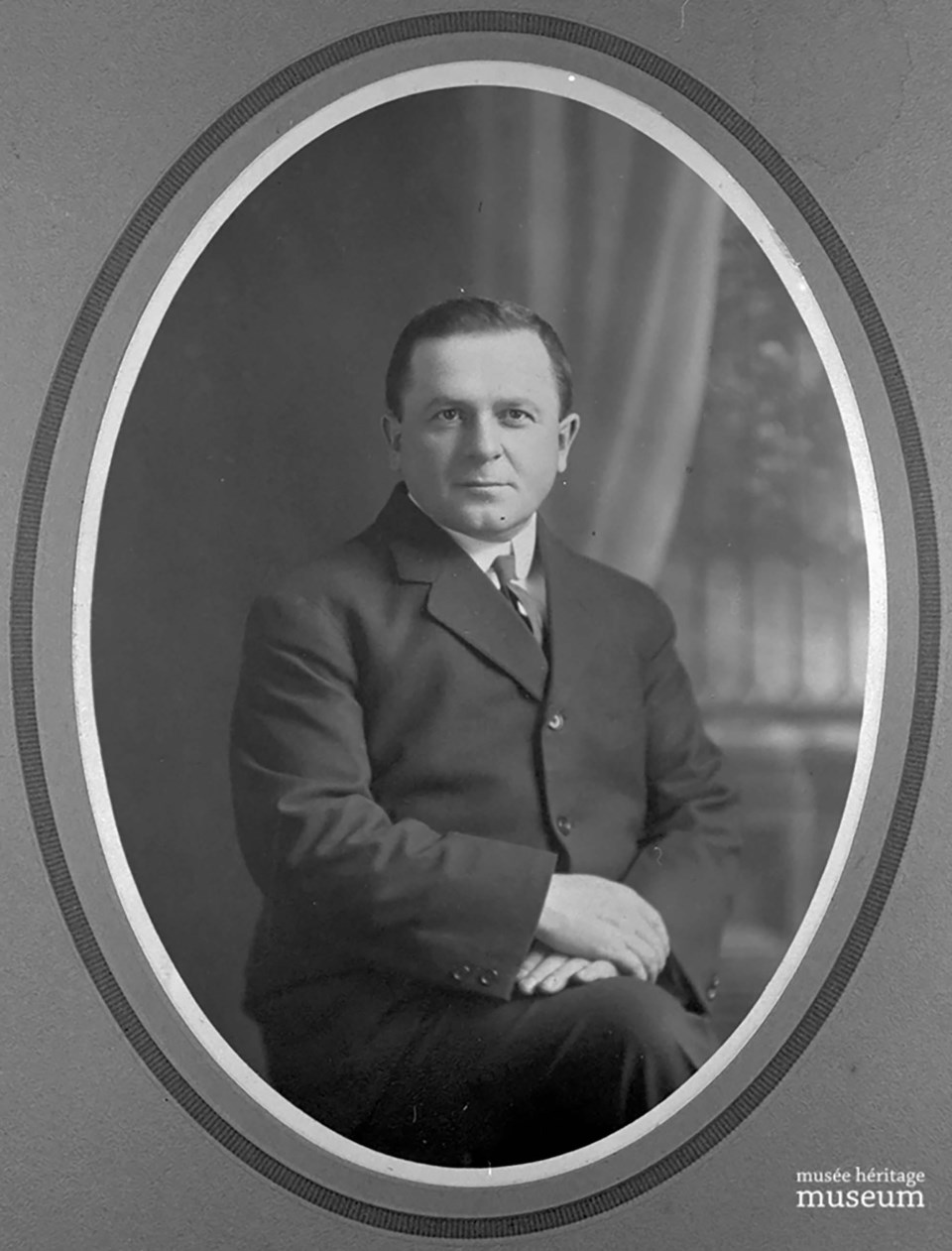What’s in a Name?
The Gazette is looking at the history behind the names of places in St. Albert in light of the city’s move to rename the Grandin neighbourhood. Curious about a place’s name? Send it in to [email protected] so it can be examined in a future story.
It’s one of the main streets in St. Albert, and it’s named after someone who didn’t want women to have the right to vote.
Boudreau Road takes its name from Lucien Boudreau, a longtime businessman and politician in St. Albert who lived from 1874 to 1962. Lucien Drive also bears his name.
While he was one of St. Albert’s first town councillors, its third mayor, and its MLA for 16 years, Boudreau is best known today as the only MLA to vote against the Equal Suffrage Statutory Law Amendment Act of 1916, which, when it passed, gave Alberta white women the right to vote in provincial elections.
“His name shall go down in history as such,” the Edmonton Journal noted at the time.
Boudreau may have this black mark on his record, but he was also a longtime and respected leader in St. Albert, said Musée Héritage Museum archivist Vino Vipulanantharajah.
“It’s a complicated legacy.”
'Little Napoleon'
Born in Quebec, Boudreau came to Alberta in 1895 and worked as a clerk in a store in Edmonton, his daughter Yvonne McGinnis writes in Black Robe’s Vision. He married Marie Renault in 1901 and became co-owner of St. Albert’s Astoria Hotel.
The hotel was located on what is now the site of the Art Gallery of St. Albert (19 Perron St.) and kitty-corner from the St. Albert Hotel (future site of the Bruin Inn), Vipulanantharajah said. It burned down and was replaced by the Royal Hotel in 1912, with the Banque d'Hochelaga replacing that in 1921.
Boudreau served on St. Albert’s first town council in 1904 and hosted council meetings in the Astoria’s sample room for $6 a year, Black Robe’s Vision reports. He served as St. Albert’s mayor in1909 before jumping into provincial politics, becoming the MLA for St. Albert that same year.
McGinnis noted her father, while big at heart, was only about five feet tall. Once, while giving an impassioned speech in the legislature, then-education minister Perrin Baker interrupted him and mocked him as “Little Napoleon of St. Albert.”
“Father thanked Mr. Baker for the compliment,” McGinnis writes, and the “Little Napoleon” nickname stuck.
Like Napoleon, Boudreau also started a small war during his time in office.
Boudreau’s brother-in-law, Morinville’s Omer St. Germain, owned a newspaper and had been using it to attack Boudreau and his party in the lead-up to the 1910 provincial election, historian Tony Cashman writes in When Edmonton was Young. Fed up, Boudreau went to Morinville and lambasted St. Germain in a public speech. A full-on brawl broke out between Boudreau’s and St. Germain’s supporters, with Boudreau at one point challenging one member of the crowd to “a bout of fisticuffs.” Boudreau won re-election despite this controversy.
Women’s suffrage
Boudreau’s place in history was cemented in March 1916 during the Alberta legislature’s debate of the Equal Suffrage Act. During second reading, Boudreau was the only MLA to speak against it.
“The place of women was in the home,” he argued, Black Robe’s Vision reports, and the women who had signed the petition calling for this vote had done so “without knowing what it was all about.”
Boudreau’s arguments against women’s suffrage were really common in 1916’s Alberta, University of Lethbridge historian Sheila McManus said in an email. He and other opponents to women voting argued that politics was too rough for women, or that they weren’t smart enough for it, or that they had more important jobs as mothers and homemakers.
The Edmonton Journal at the time lauded Boudreau’s decision, calling him a “fearless champion of a lost cause” who voiced thoughts many of his colleagues perhaps held but feared to share. (Several legislators were seen thanking Boudreau for his remarks following the vote).
Cashman writes that Boudreau “deserves full marks for courage” for taking his stand as women’s rights crusaders Emily Murphy and Nellie McClung watched the historic vote from the gallery. As the legislature cheered passage of the vote, Boudreau warned them all, “You’ll be sorry!”
Boudreau’s decision was not enough to cost him his place in the legislature, where he would represent St. Albert from 1909-21 and 1926-30. His brother in law, St. Germain, defeated him in the 1930 election.




